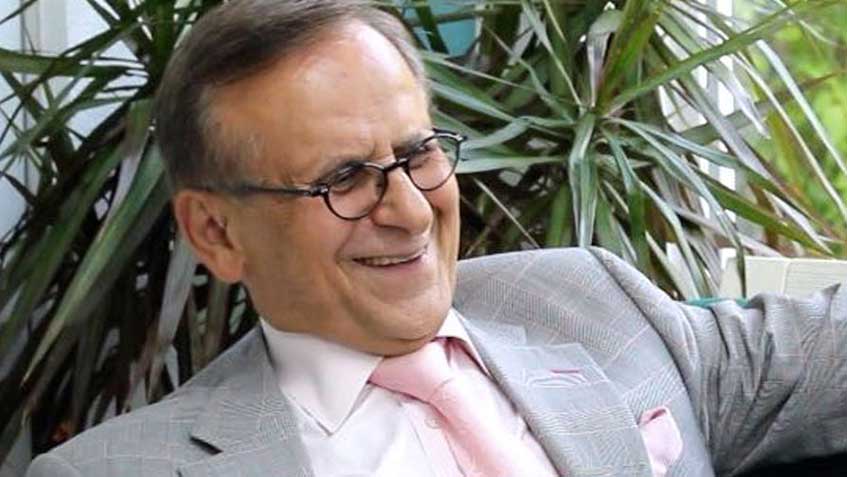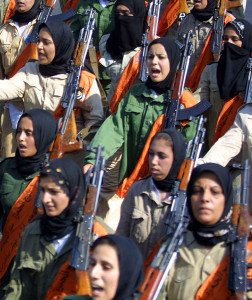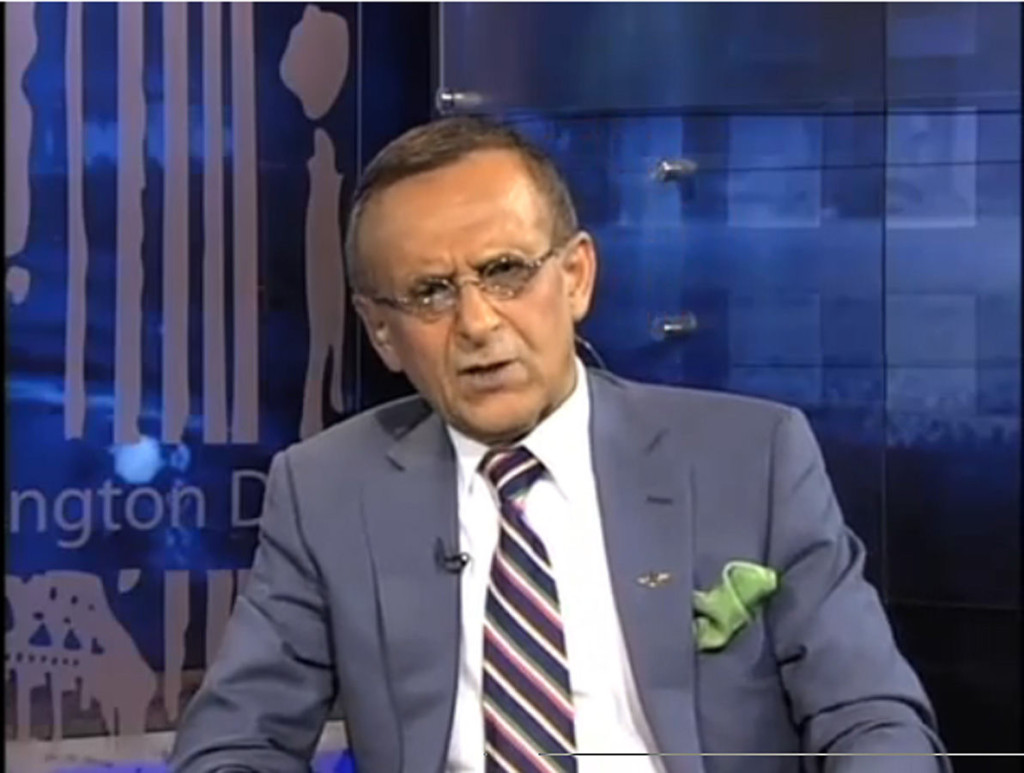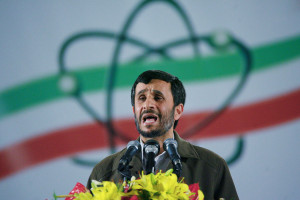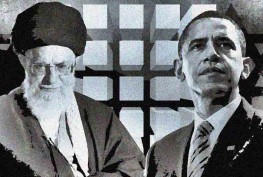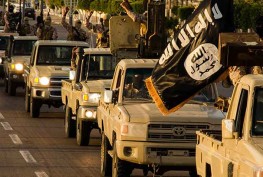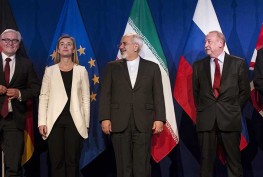With the Iran Nuclear Deal all but done, President Barack Obama now just has to convince Congress and the American people to sign off. To gain some perspective, I wanted to talk to a man who knew what he was talking about when it came to relations between Iran and the United States of America.
Luckily for me, I was able to speak with Dr. Hooshang Amirahmadi. A man who was once the solitary thread connecting the U.S. and the Islamic Republic of Iran.
Dr. Amirahmadi is a pleasant, unassuming man with sharp eyes and an even sharper sense of style. One might guess that Amirahmadi is a successful academic by his classy threads and bespectacled countenance, but it’s not initially obvious that the Iranian American was once the man to talk to if anyone from the U.S. government wanted to talk to Iran.
It was the middle of the disastrous Iran-Iraq War that Amirahmadi first became heavily involved in Iranian affairs. The war was triggered in 1980 after Iran’s Islamic Revolution, when Saddam Hussein, a Sunni presiding over the secular Ba’athist government in Iraq, invaded the Shia-led Islamic Republic of Iran with material support from the U.S.
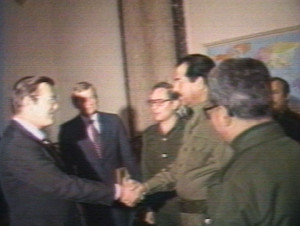 Brutal fighting raged for the next eight years, leaving millions dead and dealing a disproportional blow to Iran, both in financial and human costs.
Brutal fighting raged for the next eight years, leaving millions dead and dealing a disproportional blow to Iran, both in financial and human costs.
“In 1986, I was invited to Iran to participate in a conference on post-war reconstruction,” Amirahmadi said in an interview with Slant. “I was the first — absolute first — Iranian academic expatriate to return.”
He recalled touring the wreckage in devastated Iranian towns and villages. For three consecutive years Amirahmadi returned, each time taking in the massive scale of damage done to Iran during that war. On his final visit, the government invited him to deliver a lecture on a geopolitical theory he had developed, which would later be seized upon as a justification for ending the war with Iraq.
“In ’88, the [Iranian] government asked me to do a lecture on an argument I had developed called ‘the force theory.’ I argued that the use of force in the new world is useless and the war between Iran and Iraq will have no winner and, therefore, they would have to stop,” Amirahmadi said. “To my absolute shock, they invited me to give the lecture in May, and in July they accepted the cease-fire.”
“I think they were looking for a pretext [to end the war.] I was, at the time, an assistant professor and nothing important, but they were making me, like, the king of the castle in the U.S. and I was this mastermind of all these big theories,” he said, chuckling. “I was happy … because, after all, I was a peace activist.”
The Islamic Revolution of 1979 was markedly anti-American, aimed at deposing the repressive U.S.-backed government of the Shah and expelling Western interests from the country. Naturally, when the revolution succeeded, the new government maintained its anti-Western demeanor and suspicions of the U.S. as a self-interested superpower, labeling America a pariah. Recently anointed Supreme Leader Ayatollah Ruhollah Khomeini, the leader of the revolution, dubbed the U.S. “the Great Satan.” The U.S. was not exactly appreciative the revolution either, which had deposed a politically convenient dictatorship and led to the 444 day hostage crisis at the U.S. embassy in Tehran
The downward spiral that had begun with the American-backed coup in 1953 plummeted to new lows.
Amirahmadi came to characterize U.S.-Iranian relations by this time as “cancerous” and founded the U.S.-Iran Conference, Inc. in response. Amirahmadi’s organization represented an effort to improve diplomatic relations between the two countries and served as a forerunner to today’s American Iranian Council. Initially, both the U.S. and Iranian governments were suspicious of Amirahmadi’s true intentions, he said.
“That movement … generated what really became the discourse about U.S. and Iran relations. The discourse that focused on normalizing U.S.-Iran relations … was a taboo in both countries. In Iran, it was dangerous,” he said. “[People were saying things like] ‘he must be a CIA agent.’”
Amirahmadi began receiving anonymous death threats against both himself and his family, but he persevered to find that both sides would ultimately accept his organization’s neutrality, launching the rechristened American Iranian Council (AIC) to new heights.
In 2000, then-Secretary of State Madeline Albright stood before the AIC and delivered an historic speech in which she apologized to the Iranian people for the 1953 American sponsored coup against democratically-elected Prime Minister Mohammed Mossaddegh. She also announced the easing of some economic sanctions, although Amirahmadi noted it affected mostly luxury items available only to the wealthy.
Other notable speakers to appear before the AIC in the following years included then-Democratic presidential candidate John Kerry, future-Secretary of Defense Chuck Hagel and then-U.S. Senator Joe Biden. In short, the council was becoming kind of a big deal.
“We became a giant,” Amirahmadi said, a hint of satisfaction detectable in his voice. “We became a real giant.”
“There was a time that … I was the only contact [with Iran]. The only link.”
In 2005, Amirahmadi even ran for Iran’s presidency, only to be forcibly prevented from registering as an official candidate (as was moderate former President Mohammad Khatami.) In the parliamentary elections one year prior, thousands of reformist candidates for parliament were disqualified from running by the conservative Guardian Council. The Iranian conservatives had caught a second-wind.
Amirahmadi maintains that he would have easily sailed to victory in that election, where ultraconservative President Mahmoud Ahmadinejad, infamous for his Holocaust denial and hardline nationalism, ended up winning. Ahmadinejad’s reelection years later would be marred by protests and allegations of widespread voting fraud. Barring a race between himself and Khatami, Amirahmadi said he doesn’t believe the election would even be close if he had run.
The premise behind all of Amirahmadi’s ideas is a simple one: diplomatic relations with the U.S. is a necessary precondition for a truly democratic Iran. (Of course, Amirahmadi adds, relations with the U.S. does not guarantee democracy, or “otherwise, Saudi Arabia would be a democratic country.” They are decidedly not that.) While not sufficient alone, normalizing relations is a must, he said.
There might be some hope for that yet. Two years ago, Iran and the P5+1 powers, made up of the U.S., England, France, Russia, China and Germany, sat down to talk about the Iranian nuclear program. While mistrust has certainly characterized the talks, grueling, modest progress has been made even against the doomsday scenarios espoused by hardliners in both the U.S. and Iran. However, Amirahmadi warned that a willingness to consider just one of many outstanding issues certainly does not mean sunny days are just around the corner.
“The story is changing of course, and my hope is that U.S.-Iran relations continue to be built in the right direction, but I have my doubts,” Amirahmadi said.
“The nuclear issue is an isolated issue. U.S. and Iran haven’t touched the issue of terrorism, they haven’t touched the issue of what to do with the Palestinians and Israelis, Hezbollah and Hamas … and whether serious or otherwise, the human rights issue is a matter in the country and it harms Americans as well.”
Without significant rapprochement surrounding all of what Amirahmadi identifies as the four pillars of U.S. policy in Iran (nukes, Israel, terrorism and human rights) he was surprised that any deal that came from negotiations. The rise of organizations like the Islamic State have raised the stakes and provided a common enemy, but the frostiness of recent injustices has yet to thaw into a spring-time revival of anything resembling partnership. However, Amirahmadi suggested the Iranian public is changing, calling the government of the Islamic Revolution in Iran “exhausted” and pointing to generational rifts between religious conservatives in power and the majority of Iranian society.
“The revolutionaries go away with the generational change,” Amirahmadi said.
“The first generation revolutionary leaders continue to stick to it, because they have no other legitimacy for leadership. If you take revolution off the table in Iran, why would [Supreme Leader Ayatollah Ali] Khamenei be there? He has absolutely no reason to be there!”
“The reason is because he is leader of the revolution. If you take revolution off the table, he is finished.”
Amirahmadi, who is also the president of a Princeton-based international strategic consulting firm known as Caspian Associates, said he expects the radical destabilization of the Middle East to continue, predicting that the region will “be a complete mess for at least 50 years.”
“I feel like the Middle East has entered a dark age … a serious dark age and I don’t see any serious leadership,” Amirahmadi said.
He pointed the finger at local dictators and their foreign sponsors, including the U.S., as responsible for the current chaos, but expressed confidence in the people of the Middle East to cast off the chains of an oppressive past, emphasizing the role of democracy in helping them to recover from these new Dark Ages.
“Let me end on a positive note and say that the good news is that the people of the Middle East from Iran to Egypt to everywhere else are alive and well. They will have to struggle against these dictators and foreign invaders for democracy and rule of law and a better life, … but my hope is — and I believe — that will end, because I believe in the people … the people can see that the world has changed.”
“Those dictators merely have guns, but they don’t have the public. They don’t have legitimacy.”
Original post: https://www.slantnews.com/story/2015-07-15-why-the-deal-wont-be-sustainable-and-how-it-could-be

